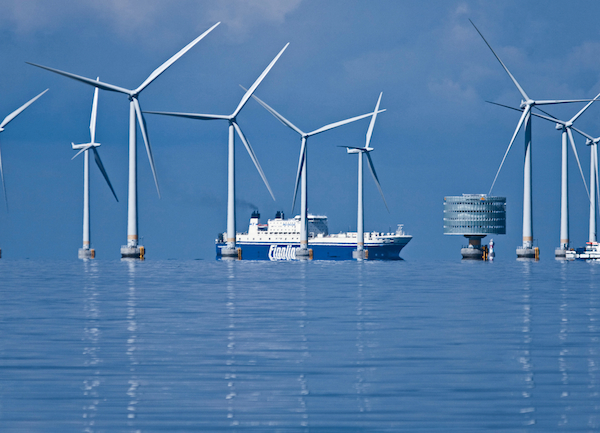The Basslink failure demands big thinking and home-grown resilience.

OFFSHORE WIND-POWER: A freighter passes through the Swedish Lillgrund wind farm, an average-sized 110-megawatt offshore facility in the Baltic Sea. Since 2008 the farm’s 48 turbines have provided enough power for 60,000 households. The circular substation houses an offshore transformer which bundles the power from the turbines for dispatch to the national grid. PHOTO Siemens
A century ago Tasmania, with a population less than half of today’s, dug deep into its public purse to invest in generating and distributing electricity.
Local councils and private companies supplied limited power at a premium price until 1914, when a company got into trouble while building a Great Lake scheme to power Hobart. The state government took over the project and set up what was to become Hydro Tasmania.
The Tasmanian hydro-electric system is a remarkable achievement. Expansion of the network in later decades, using large numbers of skilled migrant workers, enhanced our technical infrastructure and enriched our culture.
For 90 years, isolated from Victoria and other eastern states, we were solely responsible for our power network. When trouble struck, such as during the 1967-68 drought that reduced hydro dam levels to 14.3 per cent of capacity, we had to manage on our own.
Electricity rationing in the late 60s saw commercial and industrial use severely limited, trolley buses discontinued, streetlights disconnected, and households restricted to 80 per cent of the power they’d used in the same period of the previous year.
The government acquired a steam turbine ship and berthed it at Bell Bay to provide power while an oil-fired (later gas-fired) power station was built nearby. That was replaced by the Tamar Valley natural gas station in 2009, now owned by Hydro Tasmania.
Tasmanians didn’t like electricity rationing. A government led by that warrior for hydro power, “Electric Eric” Reece, was dumped the next year, ending 35 straight years of Labor in power.
The challenge we face now is potentially much tougher. The break in Basslink, still in its first decade of commercial operation, comes when Hydro storages are around 20 per cent of capacity, with a good chance they’ll drop to levels even lower than in 1968.
There are no political winners here. As energy minister, Bryan Green oversaw a drawdown of hydro storages in 2012-14 to take advantage of the Gillard government’s carbon tax by selling premium-priced Tasmanian power interstate. He’s admitted it might have been better managed.
On Saturday Senator David Bushby caned the Labor government for “recklessly” draining dams “to cash in on the windfall gain”, but he didn’t disclose that the frantic selling in the final three months of carbon pricing was presided over by the Hodgman Liberal government.
For his part, Groom is being remembered for pushing the sale of the main gas turbine at Tamar Valley power station. Mercifully, the government has stopped the sale and Tamar Valley will be up and running this week. But the Basslink failure raises many more questions about energy security.
Any delay in repairs will only increase the chance of power rationing – and its accompanying electoral damage. On a hiding to nothing, the government has no option but to reverse its current policy and begin planning for more Tasmanian generating capacity.
We rely too heavily on hydro. In the months before Basslink failed Tasmania was getting a third of its power from Victorian coal generators. Various studies have pointed to a long-term drying trend across southern states, including Tasmania, which doesn’t bode well for hydro storages.
Sadly, we’ll have to resume importing coal-fired power when Basslink is repaired. We need more solar generation and especially more wind power, which nature supplies here in abundance.
Hosting wind turbines or solar arrays could earn income for drought-stricken farms, and we could capture the power of offshore winds in shallow Bass Strait. With enough capacity we could pump water back into dams, turning our hydro storages into rechargeable liquid batteries.
For this Basslink is essential, and Groom is right to advocate a second cable. Only the national market can deliver the return on investment needed to raise the capital for such large enterprises.
But as the breakdown showed, we’ll also want some home-grown resilience. We built our hydro system because far-sighted politicians saw there was no option and people put their backs into it. We have to renew that spirit, rise above partisan bickering and get on with it.
